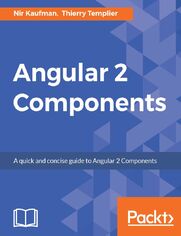Angular 2 Components. Practical and easy-to-follow guide to Angular 2 Components - Helion

Tytuł oryginału: Angular 2 Components. Practical and easy-to-follow guide to Angular 2 Components
ISBN: 9781785889400
stron: 124, Format: ebook
Data wydania: 2016-11-30
Ksi─Ögarnia: Helion
Cena ksi─ů┼╝ki: 94,99 z┼é
This book is a concise guide to Angular 2 Components and is based on the stable version of Angular 2. You will start with learning about the Angular 2 Components architecture and how components differ from Angular directives in Angular 1. You will then move on to quickly set up an Angular 2 development environment and grasp the basics of TypeScript. With this strong foundation in place, you will start building components.
The book will teach you, with an example, how to define component behavior, create component templates, and use the controller of your component. You will
also learn how to make your components communicate with each other. Once you have built a component, you will learn how to extend it by integrating third-party components with it. By the end of the book, you will be confident with building and using components for your applications.
Osoby które kupowały "Angular 2 Components. Practical and easy-to-follow guide to Angular 2 Components", wybierały także:
- PLC i TIA Portal. Kurs video. Techniki programowania SIMATIC S7-1200 200,00 zł, (10,00 zł -95%)
- Google Cloud. Kurs video. Zostań administratorem systemów IT 142,86 zł, (10,00 zł -93%)
- Instalacja i konfiguracja baz danych. Kurs video. Przygotowanie do egzaminu 70-765 Provisioning SQL Databases 285,57 zł, (19,99 zł -93%)
- Jak zhakowa 125,00 zł, (10,00 zł -92%)
- Excel w HR. Kurs video. Od teorii do praktyki 222,11 zł, (19,99 zł -91%)
Spis tre┼Ťci
Angular 2 Components. Practical and easy-to-follow guide to Angular 2 Components eBook -- spis tre┼Ťci
- 1. Angular2 Components architecture
- 2. Setting up an Angular2 development environment
- 3. Using TypeScript for more cleaner code
- 4. Defining the Component Behavior
- 5. Declaring and Creating templates
- 6. Creating a Component Controller Class
- 7. Making the component dynamic
- 8. Developing your own custom component
- 9. Integrating third-party components





